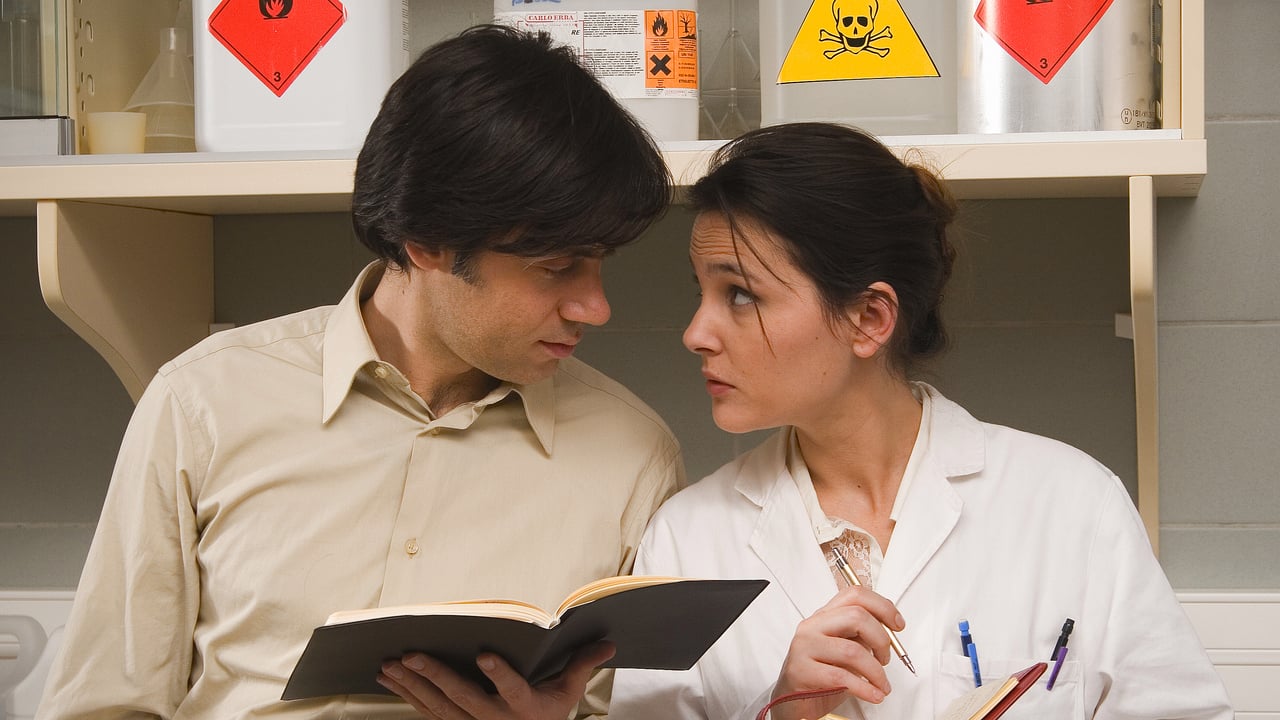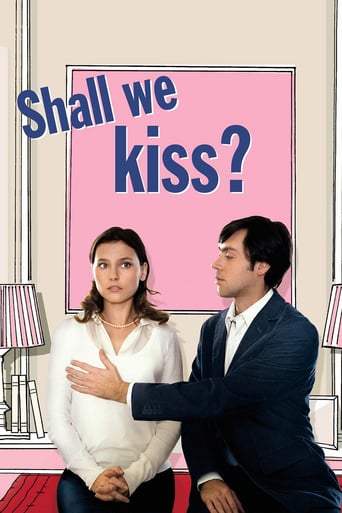

That was an excellent one.
... View Morerecommended
... View MoreDreadfully Boring
... View MoreThe movie really just wants to entertain people.
... View More"Shall We Kiss?" tells the story of complex relationships, further complicated by the simple existence of physical attraction and sexual tension. The film's four main characters have a unique chemistry (in their respective individual relationships: Judith with Nicolas and Emilie with Gabriel); relationships that can't particularly be compared to others in similar movies. It's hard to say whether this movie was good or not. What's unique and intriguing about it is the story-within-a-story concept, something that might intrigue people to watch the film. The actors did not have the usual chemistry you'd expect to see in a romantic comedy film, but somehow, they made it work. The odd way they approached certain situations with each other made the movie a bit mysterious, in a way that the viewer looked forward to the upcoming scenes. For example, in scenes where you were just ready for them to resolve their sexual tension, they would not—or they would, just in an absurd way, by touching each other as if they'd break in half if any more force were to be used. The way these two relationships unfold is enough to keep the viewer's attention.One idea that viewers might find interesting is how men and women alike have difficulty addressing their true feelings, and how to handle strong emotions towards friends and strangers when they know it could potentially ruin other relationships. For example, at the beginning of the film, when Emilie wants to kiss Gabriel, she has an internal battle between doing what's right and what's wrong, knowing that she has a significant other back home. While physically attracted to Gabriel, she tries to push off the kiss by diverting the conversation and they go and have drinks.Another idea that viewers might find interesting—not necessarily positive or negative—is how it is so common not only in movies, but in real life, for best friends to fall in love with each other. In the film, I feel as if the audience is continuously rooting for Nicolas and Judith to get together, just as I was. Their unique chemistry translates so well on screen, and I feel as if many people can relate to it or have been in similar situations themselves. Two aspects of the film that I found particularly French of the film were 1) how plain/bland everything was and 2) how stereotypically French it looks to Americans. For one, much of the wardrobe and set was white, beige, tan, or black. An example of this would be when Nicolas and Judith first get in bed: the sheets are white, the walls are white, her top is white, and he is wearing neutral colors as well. For the second aspect, Americans usually view the French as very cultured, interested in music and the arts. This is proved in the film when Claudio, Nicolas and Judith all attend an art gallery showing. I don't think this would particularly happen in American culture, especially seeing as Nicolas is a math teacher and Judith is a lab researcher.The last thing that absolutely needs to be addressed is the talent that the director, Emmanuel Mouret, has. Not only does he direct the film, but he also plays the character of Nicolas, and he plays it well. But, he should be familiar in playing such a romantic role seeing as a majority of his films are romantic comedies. He has acted in ten films and has directed 8, although having only won one actual award ("Best Screenplay" for the Art of Love at the Montreal World Film Festival). This does not mean that he's a poor filmmaker, for he has been nominated for many, he just hasn't beat out the competition. Mouret is also a screenwriter; he has written 8 titles. Having written, directed, and acted in this film, this says much about Mouret's talent.
... View More"Shall We Kiss?" is a pretty good little film--mostly because the story is very unique. It begins when Gabriel and Emilie meet. They spend a happy evening together and as they are about to part, Gabriel is about to kiss Emilie. However, she stops him--saying that even an innocent kiss COULD lead to unanticipated consequences. She then goes on to tell him a story about two people she knows of--Judith and Nicholas. It seems that both were lifelong friends and Judith was in a relationship with Claudio. However, after Nicholas breaks up with his girl, he's depressed and full of repressed sexual needs. To relieve this, he suggests, quite haltingly, to Judith that she sleep with him--as friends. However, starting with a little kiss, the two slowly fall in love and then they are stuck--Nicholas is now with a nice lady and Claudio is also a nice person. While Judith and Nicholas WANT to be together, they can't let themselves hurt their partners. Where this all goes next is something you'll need to see for yourself.While the film is a bit unsavory for its elements of adultery, it is handled in a delicate and occasionally funny manner. The overall production is quite nice--not brilliant but clearly worth your time due to nice acting and a fresh story."Before a kiss is given, no one knows if it will big or if it will be small"
... View MoreI saw this last month at the 2009 Palm Springs International Film Festival and of the 36 films I attended this would be in my top three. Not because it is skillfully executed art film or a masterfully crafted film with dynamic acting performances or with stunning art direction and cinematography and sound but simply because it so simple, original and extremely funny. I really enjoyed this romantic comedy farce from writer/director/actor Emmanuel Mouret who cast himself in one of the principal roles of Nicolas. It could be a stage play and maybe that's what Mouret had in mind when he wrote it. The story starts with Gabriel (Michael Cohen) and Emilie (Julie Gayet) who are strangers and have met by chance and enjoy an evening together as Emilie relates a story of how an innocent kiss can lead to unintended consequences. In Emilie's story told in flashbacks, she illustrates her point with that of Nicholas who confides in his friend Judith (Virginie Ledoyen) that he is addicted to physical intimacy but is afraid to start a new relationship with someone. Judith is married to Claudio (Stefano Accorsi) and doesn't want to be in a relationship with Nicholas so they come up with a plan to help Nicholas. The simple plan quickly goes wrong and escalates the problems and complications it develops throughout the story as told by Emilie. Fredrique Bel is also in the ensemble cast as Caline. The film of course a story within a story and both are delightfully spun. Mouret has delivered an absolutely charming, smart, fresh and witty film here that I would highly recommend and give it a full 10 out of 10.
... View MoreWe deserve to know more about Emmanuel Mouret, whose films Variety critic Derek Elley has with good reason called a combination of Woody Allen and Eric Rohmer. Like Woody, Mouret not only writes and directs but is his own delicately droll romantic comedy lead--who combines suggestions of Mr. Allen with M. Jean-Pierre Léaud and Mr. Petter Sellers. How come this is his sixth film and Americans haven't seen any of them? Perhaps because Mouret is a modest filmmaker, who works his way up gradually, adding a few more minutes each time: from 50, he went up to 76, then 85, and this time he's been bold enough to go to 100 minutes. This time, besides himself, following his well-received 2006 Change of Address/Changement d'adresse, which was part of the Diorector's Fortnight at Cannes, he's engaged Julie Gayet, Vieginie Ledoyen, and Stefano Accorsi as co-stars.Shall We Kiss/Un baiser s'il vous plait is an ingeniously (at one or two moments almost too ingeniously) constructed story-within-a-story. The beauty of it is that the frame-tale is so well-written and acted that we care about visiting textile designer Emilie (Julie Gayet) and Gabriel (Michael Cohen), who gives her a ride on a visit to Nantes, parlays that into a dinner date, then asks her for a goodnight kiss--though the body of the film is the story Emilie tells Gabriel to explain why she thinks even that one kiss would be a dangerous thing. Emilie and Gabriel are a sexy couple, and the suspension of that kiss really keeps viewers holding their breath even as they enjoy the surprises and machinations that now unfold. Mouret's humane and entertaining film is full of a sense of how delicate romantic feelings are and how seamlessly in a courtship the clumsy and the comic and the beautiful can blend into one another. Perhaps best of all, the writer-director envisions a contemporary world in which such a thing as courtship, with its presumption of mutual respect and good manners among all concerned, can still exist.Emilie's narrative brings in lab researcher Judith (Ledoyen), best friend of math teacher Nicolas (Mouret), who explains to her in one of their weekly tete-a-tetes that he's become so starved for "closeness" (complicité) that to be in the mood to initiate a new relationship he needs a little physical affection--and a kiss--to open him up. He's tried prostitutes, but like the young hustler protagonist of Techine's movie, they "don't kiss"--so that essential "complicité" is lacking. Shyly he asks Judith to help out. Their first attempts at intimacy are ludicrously tentative--with very French discussion back and forth about what to do next before each move forward. They wind up having sex, and though Judith lives with pharmacist Claudio (Accorsi) and (because the renewal of "closeness" apparently "worked") Nicolas soon meets and starts cohabiting with Caline ("Cuddles," Frederique Bel), the two "best friends" eventually have to admit that they can't forget the electricity of their physical encounter. Judith has to grant she isn't so crazy about Claudio any more, and Nicolas hasn't really fallen for Caline and is just hoping he might, later.Mouret's art is in the way he plays with the old idea of people who have trouble recognizing their own feelings, and the cliché, existing only to be smashed, that best friends can't become lovers. Eventually the inevitable must be recognized. It isn't hard for Nicolas to sit down at a bar and tell Caline he's found someone else he cares about more, and she takes it with aplomb. But Emilie cares too much about Claudio to dump him, and she knows he has never looked at anyone else and has fragile feelings. An elaborate ruse is devised based on Claudio's passion for Schubert, and enlisting help from the cooperative Caline.All this reminds Gabriel of something that happened to him....which is where the storytelling becomes rather intricate.The ending is ingenious, but the fun is getting there, and the way Mouret's straightforward direction, simple camera-work, and above all his witty, well-paced dialogue keep the audience consistently engaged and delighted. The music always keeps it light--and smart, with Tchaikovsky ballet music leading off many of the early scenes, and Schubert chamber and solo piano music warmly fleshing out the emotional tone as the romance becomes more intense and more complicated. If you can watch this without having fun maybe you just don't like romantic comedy--at least not the French kind.Shown as part of the Rendez-Vous with French Cinema at Lincoln Center, February 29-March 9, 2008; this opened in France December 12, 2007, receiving high marks from the critics (AlloCiné press rating 3.9).
... View More